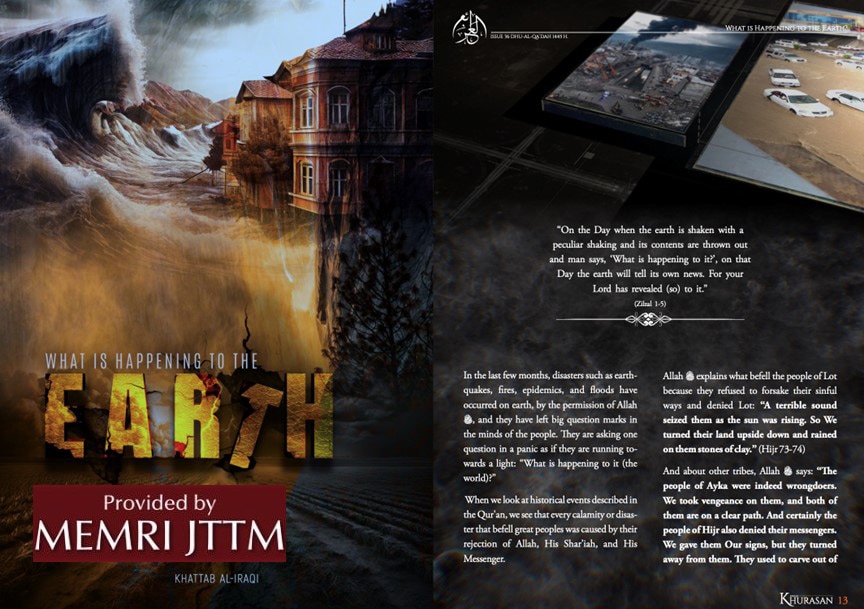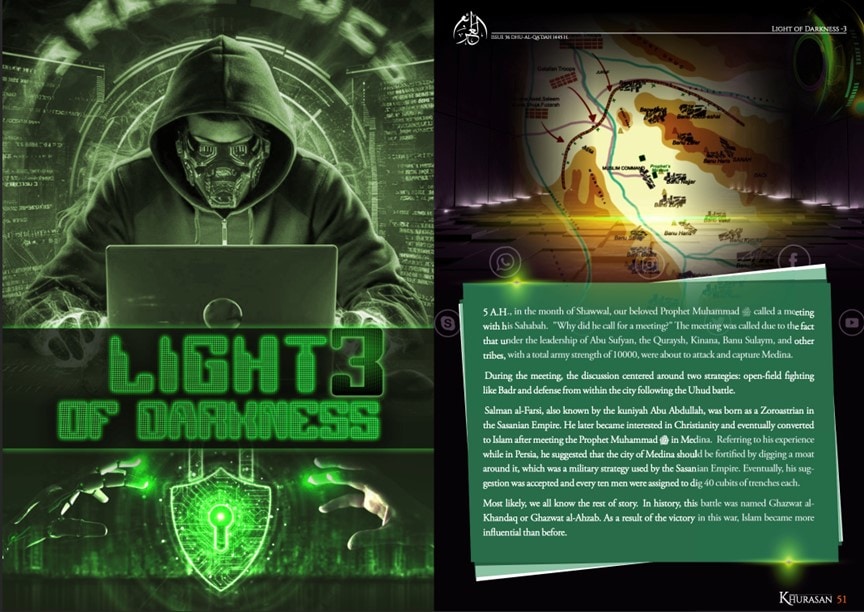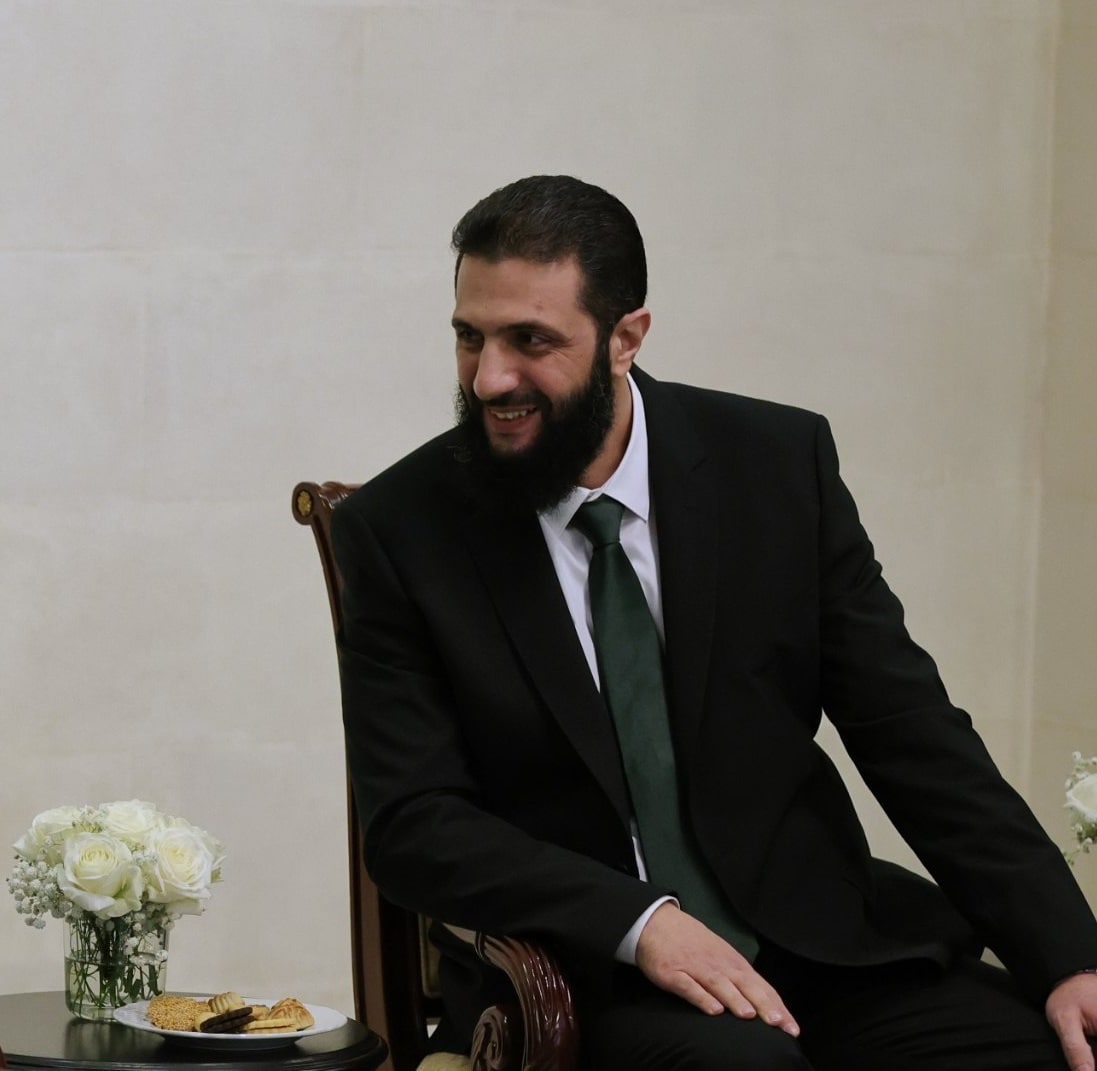The following report is now a complimentary offering from MEMRI's Jihad and Terrorism Threat Monitor (JTTM). For JTTM subscription information, click here.
Articles in the latest issue of the "Voice of Khurasan," an English-language monthly magazine published by Al-Azaim Media Foundation, a media outlet linked to the Islamic State Khorasan Province (ISKP), which defines itself as a supporting entity for the Islamic State (ISIS), argue that Allah punishes those who deviate from the right path, urge Muslims to wage jihad, and advise jihadi fighters to use social media but secure their personal data online.
Issue 36, the most recent issue of the magazine, is dated Dhu Hijjah 1445, in the Hijri calendar, which corresponds with the lunar month beginning June 7, 2024.[1] A PDF copy of the magazine was shared on the internet.

An article, titled "What Is Happening To The Earth?" argues that Allah causes natural disasters such as earthquakes, fires, epidemics, and floods. "When we look at historical events described in the Quran, we see that every calamity or disaster that befell great peoples was caused by their rejection of Allah, his shari'a, and his Messenger," it says, citing verses from the Quran. It cites Quran verses Hijr 73-74 and 78-83 in which Allah says the tribe of Ayka "were indeed wrongdoers. We took vengeance on them, and both of them are on a clear path..."
The article further says: "Yesterday, those who seemed worthy of that punishment were destroyed because they violated only a few of Allah's commands. Today, on the other hand, there are all kinds of demonstrations of shirk [idolatry] and wrongdoing against Allah..."
One of the articles is Part Four of an ongoing series titled "On the Path of Being a Faithful Servant." It urges Muslims to support mujahideen and wage jihad against the unbelievers.
It says Muslims have deviated from the religious path and teaches martyrdom, observing: "Every cause on earth seeks people to die for it. Even the rotten system of kufr [unbelief], democracy, gives heroic titles to soldiers who will die for it and puts them on the field. All causes other than the religion of Allah are human imaginations and are destined to collapse. So what is it that makes people so reluctant to establish the religion of Allah?"
The article accuses Kurdish theologian Said Nursi[2] of corrupting Islam. "With the advancement of technology, infidel-loving sects like the followers of Sa'id Nursi are giving so-called refutations to 10-year-old agnostics on the street," it says.
It also criticizes Sufism: "Sufism, which turned Islam into medieval dance rituals, added a musical flavor with all kinds of animal sounds, and was perhaps the most creature-worshipping sect of our time. Even a person with little understanding of the Quran and Sunnah could easily understand that these were superstitions."
It adds: "Turning Islam into a stand-up comedy show is not found anywhere else but in this corrupt land. An infidel who does not know the religion cannot love and rejects Islam by looking at these factions. If Islam is like this, he says, I don't want to enter this religion."

The magazine seeks donations via cryptocurrency Monero (XMR)
After the international media turned the word "mujahideen" into a pejorative term, jihadi groups introduced "muwahideen" as its replacement and to mean Islamic monotheists, derived from Tawheed (Islamic monotheism, the concept of the oneness of Allah). "In Tawheed, there is no worship of creatures; there is no living under their yoke and living in humiliation; there is no making the sheikhs rich and living in luxury and starving yourself, and there is no obligation to love and embrace infidels," it says.
The article teaches loyalty to Allah and various tenets of Islam. "The real deed that will spread the religion far and wide and engrave the law of Allah on the earth is jihad," it says and praises Osama bin Laden and Abu Mus'ab al-Zarqawi. It should be noted here that the Islamic State (ISIS) praises the late Al-Qaeda leader as well as the Afghan Taliban founder Mullah Mohammad Omar in its literature, with its argument being that they were true jihadi leaders, but their successors have gone on a different path.
"There is no doubt that the beginning of the pioneers of this century starts with the shahid [martyr] Sheikh Osama bin Laden, the valiant figure who was able to abandon millions of dollars for the Ummah, for the orphans, for those who were killed, for those who were tortured, for those who actually harmed the infidels," it says.
"And he was followed by the sheikh of jihad, the bravest of the Sunnis and the most courageous of those who stood bravely in the face of the impure, the shahid Sheikh Abu Mus'ab Al-Zarqawi[3] and worthy personalities like them, and so now Islam has risen up," it adds.
The article reminds its readers that Islamic jurist Ibn Taymiyya[4] was where the people of truth are and he replied: "Either in the dungeon, on the battlefield, or in the grave." It laments that the followers of Tawheed also do not call for jihad, stating: "Today, unfortunately, even those who speak of Tawheed do not speak of jihad because of their fear of the oppressive rulers. They have no shame despite the thousands of Muslims in dungeons and on the battlefield."
It exhorts jihadi fighters: "Oh mujahid in the fields of jihad! They talk about you because if they talk about themselves, no one will listen. They are trying to see how they can dress their breathing corpses more elegantly, while you wish that even your mutilated corpse can be a bridge to your brothers on the road to victory. You fight with your weapon so that Allah's religion will be supreme and superior. They fight with the microphone because they fear those above them and control those below them."
One of the articles is the third part of a series titled "Light of Darkness – 3." It calls for adopting technologies, wherever they are invented, to advance the cause of jihad. It cites how in the Battle of Trench in the year 626, Salman Farsi, a former Zoroastrian from Persia who had converted to Islam, advised the digging of trenches around Medina, a defensive measure he had learned in Persia.
"Here is our lesson – 'We should first accept appropriate technology until we have the best one, no matter who or where it's invented. After that, we have to rely on Allah.' Such is the field of modern technology. Social media is like a technological net thrown by the kuffar to catch us. Also, it's a great platform to communicate with our brothers and spread our message to every corner of the world in a very short time," it says.

The article advises the adoption of social media but also warns of the security issues associated with networks like TikTok, Facebook, Twitter, Instagram, and others. Subsequently, it explains how to secure the mujahideen's presence on social media networks. It notes the dangers of social media and the internet, citing examples of disinformation, hacking, data breaches, fake profiles, malicious ads, scams, and mental health issues as related to these technologies. It advises jihadi fighters on how to secure their data, saying: "To protect yourself from social media scams, be cautious about the information you share, verify the authenticity of accounts and websites before interacting with them. Always exercise skepticism and double-check any offers or requests for personal information. While Facebook data isn't 100 percent safe, you can take some steps to protect yourself as much as possible from data scams on the platform by following some steps:
"Verify Links: Before clicking on any link, especially in messages, check the URL and be wary of suspicious links.
"Keep Your Profile Private: Adjust your Facebook privacy settings to limit who can see your information.
"Use Strong, Unique Passwords: Protect your account with a strong password and enable two-factor authentication (2FA).
"Report Suspicious Activity: If you encounter any suspicious activity on Facebook, report it to the platform immediately.
"Use security features: By staying vigilant and using security features available on Facebook, you can help protect your data from scams. Protecting your social media profile involves several strategies such as using strong, unique passwords for each social media account. Consider using a password manager to keep track of them.
"Enable Two-factor Authentication (2FA): This adds an extra layer of security to your account.
"Adjust Privacy Settings: Review and adjust your privacy settings to control who can see your posts, profile information, and activity.
"Report Suspicious Activity: Take care before sharing any information: Be cautious about what you share online. Avoid posting sensitive information such as your home address, phone number, or financial details.
"Beware of phishing attempts: Be suspicious of messages or links from unknown users, even if they seem legitimate.
"Use The Latest Features: Stay updated with the latest security features and settings on your social media platforms.
"Monitor Unusual Activity: Monitor your account for any unauthorized access or unusual activity and report it immediately. (For better practices, you can follow the previous two instalments in the Light of Darkness series)."
[1] June 7, 2024. The original English of the articles used in this dispatch has been lightly edited for clarity and standardization.
[2] Said Nursi (1877-1960) inspired a religious movement that had significant spiritual influence on the movement of Turkish religious-political leader Fethullah Gülen.
[3] Al-Qaeda-affiliated Abu Mus'ab Al-Zarqawi was known as "sheikh of the slaughterers" and was head of Al-Tawheed wal-Jihad in Iraq, a precursor of the Islamic State (ISIS). He was killed in a U.S.-Iraqi operation in June 2006.
[4] Jihadis quote and reference 14th-century Islamic scholar and Sheikh Al-Islam Taqi Al-Din Ibn Taymiyya frequently for, among other things, his anti-Shi'ite stance and his writings permitting the killing of those who insult Muhammad.
The full text of this post is available to subscribers.
Please login or register to request subscription information from MEMRI





